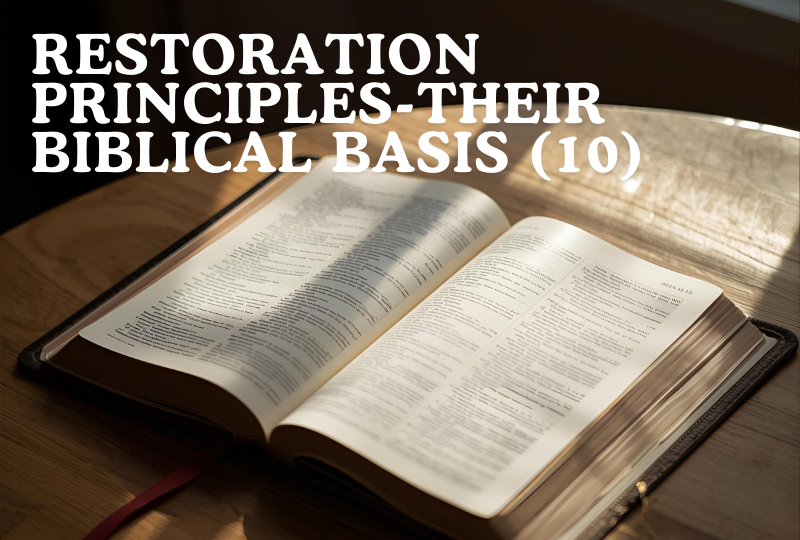
Restoration Principles - Their Biblical Basis (10)
Although the Law of Moses no longer applies in our Christian Age, having been fulfilled by Jesus' sacrifice on the cross and His subsequent resurrection and ascension (Matthew 5:17-18; Luke 24:44-47). these incidents teach us some important lessons concerning the work of religious restoration in our time.
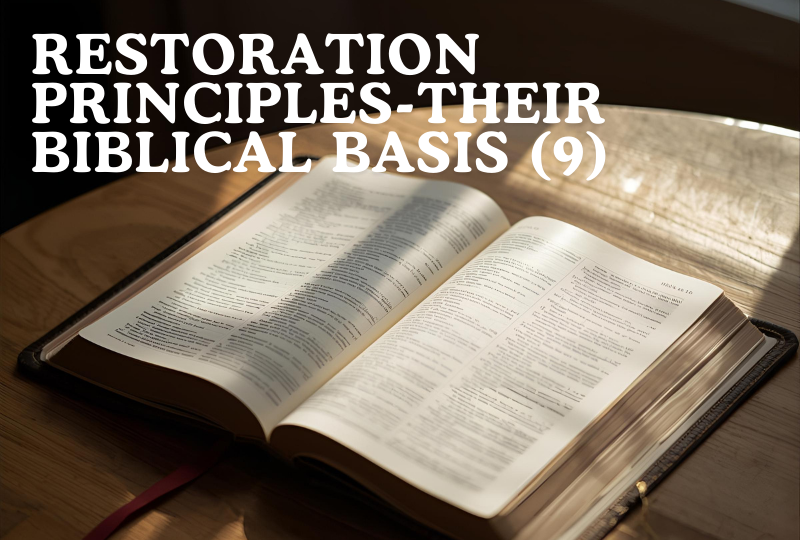
Restoration Principles - Their Biblical Basis (9)
Restoration work must not leave any aspect of the thing restored unaltered to reflect its original pattern. Whether the item to be restored is a thing (eg. a temple), an act (eg. worship of Deity) or a relationship (eg. between husband and wife), perhaps the hardest to put right is a relationship, particularly when it has to be undone.
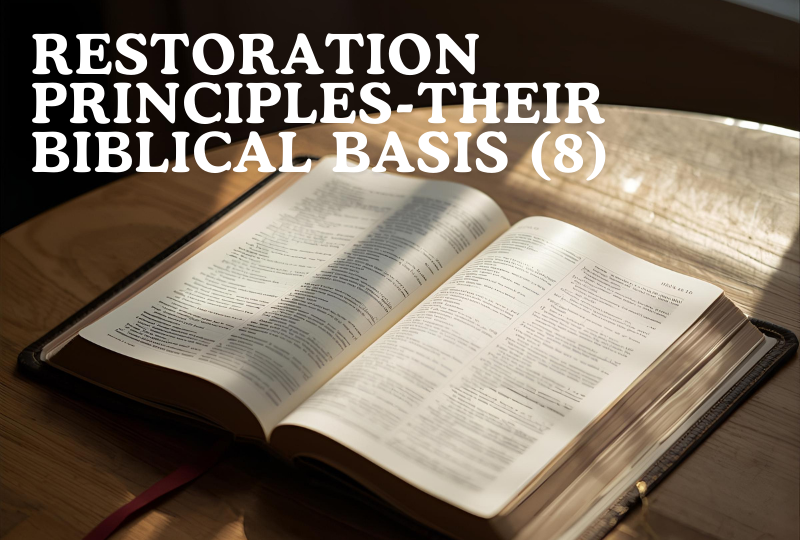
Restoration Principles - Their Biblical Basis (8)
The pre-Babylonian exile efforts of King Hezekiah of Judah and his great-grandson, King Josiah, to restore the worship of God as commanded by the Divinely-inspired Law of Moses were not continued beyond their respective reigns partly because they were top-down in implementation.
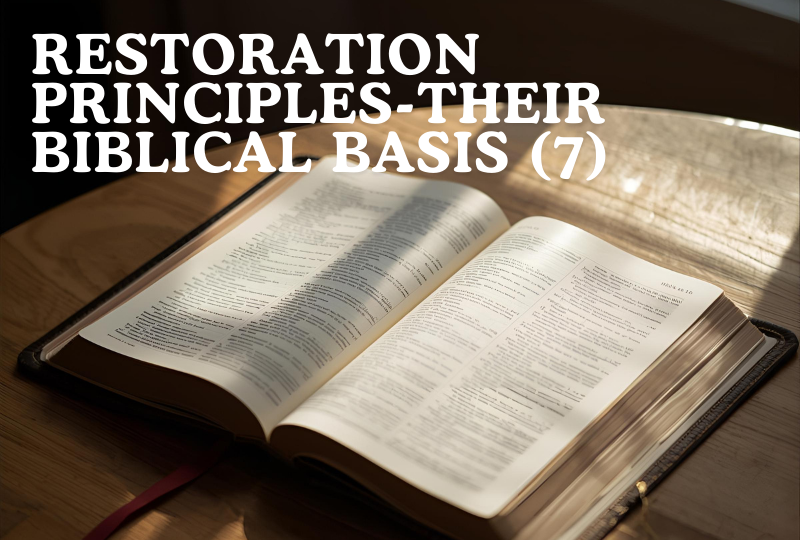
Restoration Principles - Their Biblical Basis (7)
But, more important than physical restoration of the Jerusalem temple (and the defensive walls of Jerusalem city by Nehemiah the governor later) was the restoring of the mind and heart of the Jews who had returned from the exile in Babylon.

Introduction To Subang Jaya Church's Sunday Sermon Series, 1st Quarter 2026
Introduction To Subang Jaya Church's Sunday Sermon Series, 1st Quarter 2026

SUBANG JAYA CHURCH SUNDAY SERMON SERIES January to March 2026
SUBANG JAYA CHURCH SUNDAY SERMON SERIES January to March 2026
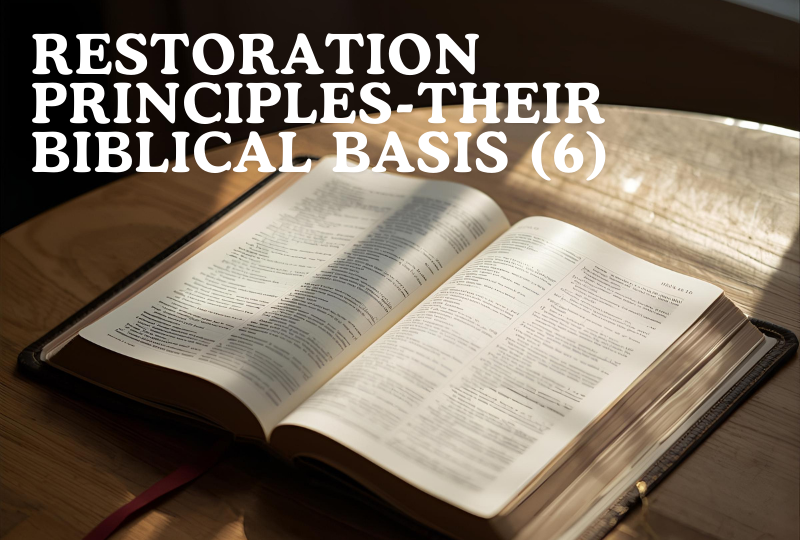
RESTORATION PRINCIPLES - THEIR BIBLICAL BASIS (6)
Within only 57 years of the death of King Hezekiah, who restored worship and service to God in Jerusalem according to Moses' law, his great-grandson, Josiah, had to undertake all over again the work of religious restoration in Judah.

RESTORATION PRINCIPLES - THEIR BIBLICAL BASIS (5)
The work of restoring service to,- and worship of,- our Father is a seriously difficult task to begin and carry through completion

RESTORATION PRINCIPLES - THEIR BIBLICAL BASIS (4)
We call Bible things by Bible names and we do Bible things the Bible way

RESTORATION PRINCIPLES - THEIR BIBLICAL BASIS (4)
There would be nothing to restore if the "faith once for all delivered to the saints" (Jude 3)

RESTORATION PRINCIPLES - THEIR BIBLICAL BASIS (3)
There would be NO need for restoration if there is no original pattern of belief and conduct to believe and obey to begin with NOR if that original pattern was never meant to be preserved over time NOR if the original pattern had never been adulterated or deviated from.

RESTORATION PRINCIPLES - THEIR BIBLICAL BASIS (2)
At the heart of religious restoration is a commitment to return completely to a previous order of things when conditions,- belief, worship and moral conduct,- were correct by God’s standards.

RESTORATION PRINCIPLES - THEIR BIBLICAL BASIS (1)
Over the centuries after the Cross that claimed the physical life of Jesus and His resurrection from the dead, the chief scandal of Christianity is that of division and dispute among Bible-believers.

PARENTING IN THE DIGITAL AGE
Offsprings are a Divine heritage and reward, whose parents “will not be put to shame” (Psalm 127:3-5), but only if sons and daughters have been chastened (i.e. disciplined) by their parents (Hebrews 12:7-11).

TRUTH VERSUS MISINFORMATION IN THE DIGITAL AGE
Truth is correspondence with reality and is the opposite of untruth or error. Whether intended to deceive or not, misinformation is untruth and cannot free us from any bondage to the consequences of sin (John 8:31-36).

MODERN TECHNOLOGY IN PREPARING LESSONS & SERMONS
Preparing Bible lessons and sermons is not difficult because it only requires the proper handling of information readily available from merely one source, God’s word (2 Timothy 2:15; 4:2)

THE CHURCH IN A VIRTUAL WORLD - THE PROS AND CONS OF ONLINE WORSHIP (Hebrews 10:23-24)
The modern world is “virtual” in particular reference to our ability today to do almost anything without in-person communication. We can “get in touch” via many modes of information technology, reaching one another clearly and in “real time” (across time-zones!) if our internet connection is unhindered

Skilled in the word of Righteousness (Hebrews 5:13) Part 24
As custodians of the OT scriptures and with the help of other Israelites or Jews (Nehemiah 8:7-8), the priests were educators of the people in the revealed ways and will of God, (Malachi 2:7), until the coming of the Son of God, Who placed His authoritative (Matthew 17:5; Hebrews 1:1-2) stamp confirming the reliability and trustworthiness of the preserved OT scriptures as Divine revelation.

Skilled in the word of Righteousness (Hebrews 5:13) Part 23
Having made a prima facie case that the New Testament,- especially the four gospels and the Acts of the Apostles,- are a reliable record of historical facts (including facts relating to supernatural phenomena, like miracles), we then located in those reliable scriptures evidence of the claims and miraculous works of Jesus Christ that He was human AND DIVINE. Jesus was “worshiped” (Matthew 28:17), as only Deity or God should be.

Skilled in the word of Righteousness (Hebrews 5:13) Part 22
In the three recorded instances of the Jews inferring that Jesus was claiming to be God, Jesus could have very easily dispelled their inference by denying He was claiming to be God. If the Jews were wrong to thus infer, it was His custom to correct them unequivocally (eg. Matthew 22:29). Here were three opportunities to declare clearly that He was NOT claiming to be God. However, Jesus did not so declare.